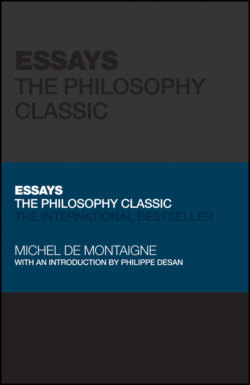Читать книгу Essays - Michel de Montaigne - Страница 16
ON TIME AND HISTORY
ОглавлениеMontaigne wrote his Essays at a time of great social, religious, and political transformation. In the face of this turmoil, he preferred to focus his attention on the present moment, believing it impossible to predict future behaviors and actions. He considered it a waste of time to imagine a better tomorrow, and to focus on the now:
“I do not paint its being. I paint its passage; not a passing from one age to another, or, as the people say, from seven to seven years, but from day to day, from minute to minute, I must accommodate my history to the hour” (III, 2).
Montaigne made a famous declaration on the wars of religion: “It will be much if, a hundred years hence, it be remembered in general that in our times there were civil wars in France” (II, 16). He was obviously wrong, but that is not the gist of his point. He approached history on a very pragmatic level and could even be labelled a “conservative” when it came to social action. His position was always to avoid turmoil in the public sphere and to therefore make do with the social order in place. Liberty was for him a matter of free speech and freedom of conscience but was never followed by a call to arms. That meant peace at any price, even if the benefits fell to reactionaries. However, this conservatism only applied to public life. His book, on the contrary, represented a personal space to express compassion, respect, and appreciation of differences.
Montaigne theorizes his conception of “immediate history” in several places. For him, events might be given historical importance because they are ideologically invested at different times. The present does not yet have the capacity to “transform documents into monuments” (to cite the French historian and philosopher Michel Foucault in The Archaeology of Knowledge), and, for Montaigne, events of his time are purely anecdotal and therefore relegated to an exemplary status. In this sense, Montaigne always remains close to an atomist conception of society and history, rather than looking for great themes or laws that thread through it.
The people, for example, remain an unpredictable entity whose motivations and actions can never be explained in a reasoned way. What is the use of explaining events that respond to other logics, at other times? The social and religious fragmentation of the late Renaissance generated in Montaigne a form of relativism which did not allow any regrouping or organization into rules or laws. We do not learn from the past; it is in this way that the wars of religion can never be invoked in a didactic way. Memory does nothing to help reason.
Let us remind the reader, one last time, that the Essays were written over 20 years. It is therefore normal that political and ideological positions expressed in a specific social and political context would change over time. Montaigne, like many of his contemporaries (Machiavelli for example), is pragmatic when it comes to politics, and his sense of adaptation (not to mention evolution) is reflected in his ability to absorb contradictions within the same book, while claiming that his views do not contradict each other. Montaigne literally puts himself to the test:
“whether it be that I am then another self, or that I take subjects by other circumstances and considerations: so it is that I may peradventure contradict myself, but, as Demades said, I never contradict the truth. Could my soul once take footing, I would not essay but resolve: but it is always learning and making trial” (III, 2).
Montaigne's position towards the Reformation, for example, changed over time, until it became compatible, in the early 1580s, with the current of politics which sought to guarantee civil peace and was therefore ready to grant more freedoms (of conscience and worship) to Protestants. During times as tormented as the civil wars in France, we understand the difficulty of thinking about the social realm in a systematic fashion. Too many counter-examples weaken possible conclusions on political actions and modes of social organization. Moreover, the acceleration of events gives the feeling of a headlong rush. If we are to produce a theory of anything, it is at the daily level – and, in this sense, this is what Montaigne is doing.
Of course, his study of antiquity allowed Montaigne to find a certain stability of example that contemporaneous events did not provide him. But he was fully aware that things were changing fast, and that his world would never be the same – like the world of the cannibals encountering the foreign invaders. Living through the savagery of the religious wars produced a form of skepticism that was far from academic. It also shaped the form of the essay and produced a permanent questioning.
